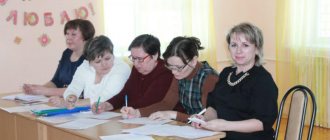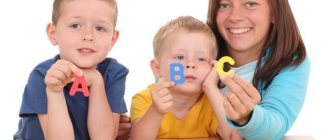DEVELOPMENT AND CORRECTION WORK
Psychocorrectional technologies are included in the context of developmental work with preschoolers. The subject of activity of a teacher-psychologist in this area is not the correction of shortcomings in students, but the development of methods of self-regulation in them in a variety of educational situations that will help them become successful, achieve the required level of mastery of the educational program and, as a result, will lead to positive changes in the area of existing development difficulties.
Developmental work involves the creation of socio-psychological conditions for the normal psychological development of pupils. Psychocorrectional work involves psychological support for students who have difficulties in: mastering the educational program, behavior, social adaptation and personal development.
The correctional and developmental work of a teacher-psychologist at MBDOU No. 8 is based on an integrated approach and begins with diagnostic and analytical work. Medical records are analyzed to identify children with disabilities; information cards filled out by teachers in order to identify students in need of psychological support. A teacher-psychologist conducts screening diagnostics of MBDOU pupils, analyzes its results, and also identifies children in need of psychological support. If a pupil has complex developmental disorders: medical, psychological, speech therapy, the child is sent to the primary medical education center No. 8, and an individual correctional and developmental program is drawn up.
Direct correctional and developmental activities can be:
- group (front);
- individual.
Group classes are held in the group premises of the preschool educational institution. These are classes on the prevention of socio-psychological climate in a group. Individual classes are also held in group rooms; in the warmer months, classes are possible in the gazebo during a walk.
The content and structure of the lesson vary in accordance with age patterns, individual characteristics of children, the purpose and objectives of each lesson.
For group correctional and developmental work in middle and senior groups, the “Path to Your Self” programs are used. The author of this program is Olga Vladimirovna Khukhlaeva, Doctor of Pedagogical Sciences, Candidate of Psychological Sciences, Professor. In the school preparatory group, group correctional and developmental classes are held according to the program “Adventures of Future First-Graders” by Natalya Yuryevna Kurazheva, a child psychologist and psychotherapist.
In his work, the educational psychologist at MBDOU No. 8 uses elements of art therapy, guided by the technologies of M. V. Kiseleva, associate professor of the department of “Counseling Psychology, Health and Development Psychology” of the St. Petersburg Institute of Practical Psychology and Social Work.
Art therapy is a complex of various forms of creative (artistic) self-expression using drawing, music, play therapy, fairy tale therapy, dance therapy, body-motor therapy, and sand therapy. These methods provide support to the child to stimulate his personal growth and development.
Self-knowledge, self-acceptance, self-realization, and self-actualization of the individual gradually occur. The necessary conditions are created for self-expression and self-knowledge.
Various methods of depiction are the most accessible and attractive type of creative activity for a child, which uses basic artistic means and does not require previous experience in drawing. There is no need to worry about the beauty of the works, the dance or the harmony of the sound of the song, this type of art is used for the purposes of liberation, expression, relief.
The work of a teacher-psychologist has a wide range of indications for carrying out art therapeutic work not only with children, but also with the teaching staff:
∙negative self-concept, disharmonious self-esteem,
∙difficulties in emotional development, impulsiveness, increased anxiety, fears, aggressiveness;
∙feeling of loneliness, stress, depression;
∙conflicts in interpersonal relationships, dissatisfaction in the family situation.
PERFORMANCE OF CORRECTION AND DEVELOPMENT WORK
In September 2016, children from two school preparatory groups were diagnosed, and Pavlova-Rudenko’s rapid diagnostics were used to identify the children’s level of readiness for school. 38 children were examined.
— 59% of children are ready to start regular education.
— Conditionally ready to start school – 31% of children;
— 10% of children are not ready to start regular education.
After the diagnosis, group classes were held during the school year according to Kurazheva’s program “Adventures of Future First-Graders” with the aim of developing the cognitive sphere of older preschoolers.
Between October and January, 17 group lessons were conducted in two preparatory groups. Classes were held once a week. Interim diagnostics at the end of the semester using the Kern-Yerasik “school maturity” method showed:
— ready to start regular education – 67% of children;
— conditionally ready to start school – 28% of children;
– not ready to start regular education – 5% of children.
Since the beginning of the school year, at the request of parents and educators, individual work has been carried out with children with increased anxiety - 1 child, with aggressive ones - 3 children; for the development of fine motor skills - 2 children; child-parent relationships – 5 children; for increasing self-esteem – 5 children.
As part of individual correctional and developmental work with children, the following programs were used: T.D. Zinkevich-Evstigneeva “Workshop on fairy tale therapy”, T.M. Gradenko, T.D. Zinkevich-Evstigneeva “Miracles on the Sand”, Kiseleva M.V. "Art therapy in working with children."
Intermediate diagnostics (“Anxiety Test”, projective technique “Cactus” and “Non-existent animal”, technique “Ladder”) showed positive dynamics in the psychological states of children. The level of anxiety and aggressiveness decreased, self-esteem increased. Educators and parents note positive changes in children's behavior.
Diagnosis of readiness for school
- Yasyukova L.A. Methodology for determining readiness for school.
- Semago N.N., Semago M.Ya. “Psychological and pedagogical assessment of readiness to start school.”
- Ekzhanova E.A. "Diagnostic and prognostic screening in the first grades of secondary schools."
- Varkhatova E.A., Dyatko N.V., Sazonova E.V. "Express diagnostics of readiness for school."
- Method of express diagnostics of intellectual abilities of children 6-7 years of age (MEDIS)
- Kern-Jirasek School Maturation Test.
PSYCHOPREVENTIVE WORK
The psychoprophylactic work of a teacher-psychologist at an MBDOU is aimed at developing among teachers, students and their parents the need for psychological knowledge, the desire to use it in working with a child or in the interests of their own development, creating conditions for the full mental development of a child at each age stage, as well as timely identification and prevention of such characteristics of the child that can lead to certain difficulties, deviations in intellectual and emotional development, in his behavior and relationships.
Preventive work with preschool children is aimed at developing communicative, cognitive and creative abilities, the emotional sphere and social adaptation of children.
Preventive work with parents and teachers is educational in nature. Planned and carried out in the form of consultations and trainings.
Work with teachers is aimed at preventing emotional burnout, increasing efficiency in working with children and parents, and professional and personal growth.
Diagnostics of adaptation to preschool education
Monitoring a child during the adaptation period is an important diagnostic direction in the work of a psychologist. It allows you to collect data about the child and draw a conclusion about the degree of adaptation to kindergarten. There are many techniques with which you can carry out this observation. I suggest you get acquainted with the list of some of them.
- Ronzhina A.S. “Diagnostics of the level of adaptation of a child to a preschool institution.”
- Methodology of A. Ostroukhova “Studying the degree of adaptation of a child at a preschool educational institution.”
- Methodology of Vatutina N. D. “Determination of the degree of adaptation to preschool educational institutions.”
EDUCATIONAL WORK
Psychological education is an important component of the preventive direction of the work of an educational psychologist. In modern society, psychological knowledge and skills are not yet widespread enough, especially respect for the characteristics of a child’s personality. Also, in teaching teams and in families, conflicts are possible, based on the inability and unwillingness to understand one’s own relationships, experiences, actions, to listen to each other, to understand. The main purpose of psychological education is to acquaint educators and parents with the basic patterns and conditions for the favorable mental development of a child, explain the results of psychological research, and create the need for psychological knowledge and the desire to use it in working with a child or in the interests of developing one’s own personality. Psychological education takes place in the form of lectures, conversations, seminars, distribution of printed materials, publications on the MBDOU website.
Diagnostics of personal and emotional-volitional characteristics
- Methodology “Emotional faces” (N.Ya. Semago) (Goal: assessing the possibility of adequate recognition of the emotional state, the accuracy and quality of this recognition.)
- Anxiety test (Temml R., Dorki M., Amen V.) (Purpose: determining the level of anxiety).
- Test for identifying children's fears A.I. Zakharov and M. Panfilova “Fears in houses” (Goal: identifying and clarifying the prevailing types of fears in children over 3 years old).
- Eight-color Luscher test (Purpose: study of the child’s emotional state).
- “Ladder” technique. Modified by S.G. Yakobson, V.G. Shchur. (Purpose: self-esteem research).
- “Locomotive” technique (S.V. Velieva) (Goal: determining the characteristics of the child’s emotional state).
- Methods for studying children's self-awareness (N.L. Belopolskaya) (Purpose: to study the level of formation of those aspects of self-awareness that are associated with the identification of gender and age).
- Graphic technique M.A. Panfilova “Cactus” (Goal: identifying the state of the child’s emotional sphere, identifying the presence of aggression, its direction and intensity).
- Methodology “Magic Land of Feelings” (Purpose: study of the psycho-emotional state of the child).
- Makhortova G.Kh. Projective methodology for personality research “Tell a story.” (Purpose: personality research).
EXPERT WORK
Expert activity is a special way of studying innovative phenomena and processes in education to discover the potential for further development (G.A. Mkrtychyan, 2002).
The main areas of expert work in preschool educational institutions:
- Participation in the development of the regulatory, legal and documentation framework for the functioning of a psychological, medical and pedagogical council on the basis of preschool educational institutions for the support of children with special educational needs (disabilities).
- Study of the influence of the social situation of development on the characteristics of the child’s psyche.
- Study of the effectiveness of students’ assimilation of the educational program.
- Participation in the formation of a subject-development environment that meets the requirements of the zone of proximal development and the current level of development of the child.
- Monitoring compliance with preventive measures that help relieve psycho-emotional stress in children and staff - correction of routine aspects (organization of sleep, nutrition, optimization of motor activity, training of the body’s thermoregulatory system).
Diagnostics of cognitive processes
Now there are many different diagnostic kits, which have already selected all the necessary methods for diagnosing cognitive processes in children of different ages. All you have to do is choose which one you like best. Below I have provided a list of the most popular ones.
- Rudenko L.G., Pavlova N.N. Express diagnostics in kindergarten: a set of materials for educational psychologists in preschool educational institutions.
- Rudenko L.G., Pavlova N.N. Psychological diagnostics and correction at an early age.
- Strebeleva E.A. Psychological and pedagogical diagnostics of the development of children of early and preschool age.
- Kurazheva N.Yu., Kozlova I.A., Tuzaeva A.S. Diagnostic complex “Tsvetik-Semitsvetik” for children 3-7 years old.
- Zabramnaya S.D., Borovik O.V. Practical material for psychological and pedagogical examination of children


